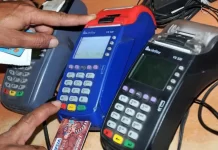“The same ladder that brings one down, also takes another up. This life no balance,” Nigerians say.
This is exactly what we witnessed in Nigeria when there was cash crunch.
Now, the whole thing is coming to limelight, as figures begin to come out to put bare the real effect of the withdrawal of cash in circulation in Nigeria.
So, while many banks began to experience a drop in physical transactions, those who had prepared for a period of low cash in circulation saw a rise in the number of electronic transactions.
Basically this surge in electronic transactions in Nigeria was because many could not access cash for their day to day transaction.
It was a situation that persisted for over two months.
Read Also: PICTORAL: Twitter Removes Atiku, Obi, Tinubu Verification Badges
In its report for the first quarter of the year 2023, the Nigeria Interbank Settlement System (NIBSS), revealed that the value of e-payment transactions rose to ₦135.52 trillion.
A figure that represents 298% increase year-on-year (YoY) compared to ₦34.04 trillion in the same period last year.
The NIBSS data further revealed that the volume of e-payment transactions surged by 984% to 4.7 billion in Q1’23 from 433.4 million in Q1’22.
A breakdown shows that the NIBSS Instant Payment (NIP) channel had the highest value of transactions with ₦123.72 trillion and the largest volume of transactions with 2.5 billion during the period.
The value of e-payment transactions stood at ₦42.42 trillion in January, but it decreased by 4.3% month-on-month to ₦40.6 trillion in February before rising by 34% to ₦54.5 trillion in March.
Similarly, the volume of e-payment transactions increased by 29% to 1.12 billion in January, and rose by 46% to 2.13 billion in March.






